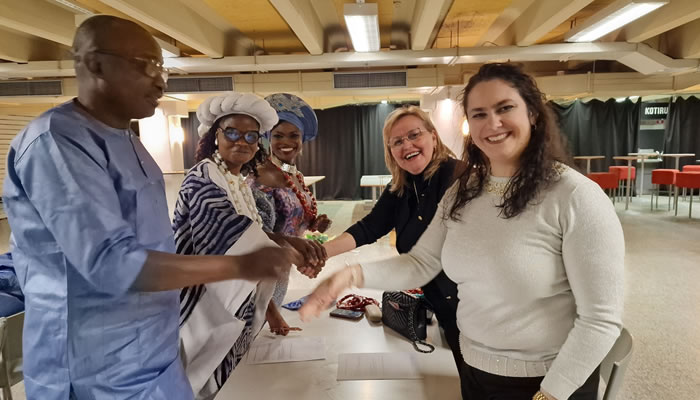Stakeholders in the fashion sector say Nigeria is on the verge of a major fashion industry boom, as global investors and designers begin to show serious interest in the country’s local labour, production capacity, and improving technical standards.
President of the Association of Women in Fashion Tech (AWIFT), Bukola Ajani, said Nigeria is becoming a top destination for garment production and fashion technology. She said this was due to changing economic conditions and policies from the Federal Government that now favour local production.
After her return from Finland where she attended the Afrikan Wedding Fair in March, Ajani explained that Nigeria, and Africa as a whole, is now seen as a better alternative for global fashion production. She mentioned factors like high import tariffs and the fall of the naira as part of the shift.
“What we did in Finland was to connect African fashion entrepreneurs to European markets,” she said. “We participated in the fashion runway and signed a knowledge transfer agreement.”
She revealed that this agreement will run through 2025 and is aimed at building local capacity in Nigeria through a structured, three-phase European training programme. In the first phase, European trainers will arrive in Nigeria to conduct practical sessions. The second phase will include online follow-ups and another round of physical training. The final phase will take selected participants to Europe for hands-on experience.
“It’s a train-the-trainers project. The Europeans will come in June. Then we’ll do follow-up training in September and October. By February next year, the selected interns will travel to Europe for the practical part,” Ajani explained.
She added that the initiative will integrate advanced technologies like AI-based design tools, 3D prototyping using CAD, and virtual runways powered by augmented reality (AR), which will revolutionise the entire garment production value chain.
Ajani also pointed out that Nigeria’s fashion industry is now benefiting from the currency devaluation and increased import tariffs on finished clothing. According to her, this makes foreign production less attractive to Nigerian businesses and encourages local manufacturing.
“The naira devaluation helped us,” she said. “People used to go to China or Turkey for production. Now, importing is expensive. It’s cheaper to produce here.”
She said foreign companies are also eyeing Nigeria because of its cheap labour, made even more affordable by the exchange rate. Ajani believes this growing interest, both local and international, is making Nigeria a key player in African fashion tech.
“We are not just making clothes anymore. We are building capacity, applying technology, and raising standards,” she said.
Ajani, who is also the CEO of Garment Consult, called on the government to continue supporting the sector through friendly policies and international collaborations.
In a separate virtual interview, the President of the Central Eastern European and West African Business Association, Michael Dada, supported Ajani’s views. Dada is also a co-organiser of the Afrikan Wedding Fair. He said the rising costs in Asia and Europe are forcing companies to seek new production hubs in Africa.
“Labour costs are rising in Europe. Companies are now looking away from China, India, and Pakistan,” Dada said. “That’s why we started the Afro-EU Fashion Hub in 2013 — to support African designers in Europe. Now we’re bringing that partnership to Nigeria with training, tech, and marketing.”
Dada said plans are underway to host the Afro-EU Fashion Summit in Lagos to strengthen these growing relationships between the continents.
Meanwhile, Omolara Odediran, organiser of the Afrikan Wedding Fair in Finland, said fashion was the main attraction of the event, even though sectors like real estate and finance also participated.
“I hosted the fair to showcase African culture and creativity. It also gave the African community in Finland a platform,” she said. “The fair is helping to create business visibility for African brands through partnerships and a business directory.”
Ajani said the fashion industry is growing stronger and more competitive, especially with the implementation of the African Continental Free Trade Area (AfCFTA), which allows for easier trade across African countries.
She said, “AfCFTA makes it easier for investors to reach other African markets from Nigeria. That’s why we must improve our standards. Are we going to produce substandard goods? No. That’s why the training is important.”
With fewer finished garments now being imported, she said more importers are bringing sample designs to Nigeria for local production.
“The fashion sector is changing. We’re no longer only designers — we are creators, tech users, and global competitors,” Ajani said.
